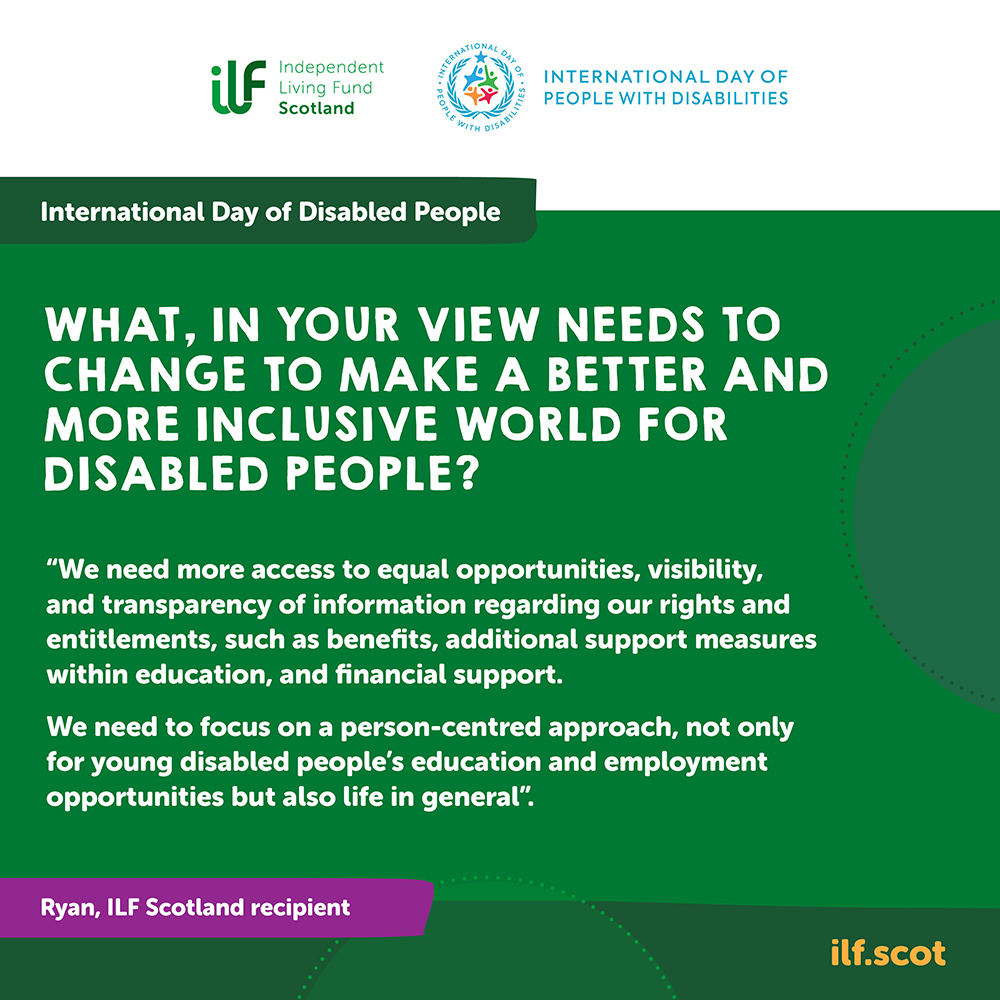
The International Day of Disabled People observed annually on 3rd December, is a campaign aimed at increasing public awareness and understanding of people with disabilities.
This IDWPD, we are ‘handing the mic’ to disabled people, so they can share their stories and experiences and explain what challenges we need to overcome to bring about a world where a person is not characterised by their disabilities but by their abilities.
We are grateful to recipients who have agreed to share their stories of what IDPWD means to them. The challenges they and so many have faced that have been exacerbated by the COVID-19 pandemic, yet they have achieved so much.
In this blog we speak to Ryan, an ILF Scotland Transition Fund recipient and Young Ambassador from Glasgow who is autistic.
Tell us a little bit about yourself?
“I’m Ryan; I’ve lived in Glasgow all my life and I have Autism.
“Martial arts have been a long-term passion of mine, but I also enjoy activities such as drawing, swimming, forest/park walks and hiking around the hills surrounding Glasgow and beyond. I am proud to say I walked up Ben Nevis as part of my DOE Gold award earlier this year raising money for charity at the same time.
I love all forms of media this includes reading books, capturing photographs of the Scottish countryside, listening to music, and going to the cinema. I also now enjoy experimenting and trying new foods and flavours, this is a big change from my younger years as dinner was mainly chicken nuggets and waffles!”
What does IDWPD mean to you?
“It is an opportunity for young people like myself to speak about our experiences in life. It gives us the opportunity to discuss and highlight how we have and haven’t been supported, and the impact it is having on us on a daily basis. It will also showcase what we feel can be done to ensure better support is in place for the future.”
What do you think are the biggest challenges disabled people face today?
“Mostly the lack of available opportunities concerning education and employment are two of the biggest challenges, and ensuring that appropriate support measures are in place to allow us to develop and grow.
“Interdependence is very important to disabled people and ensuring the right balance is in place for us to succeed is crucial. We need other people to support us, and make us feel included in all matters and play an active role in our own development and future.”
What challenges have you faced personally during COVID-19?
“Over the pandemic, I had to deal with many challenging issues such as:
What barriers have you overcome that you would like to share?
“Mainstream education gave me a multitude of hurdles to overcome. This included a lack of appropriate support, poor communication between all relevant stakeholders, a lack of understanding of my needs, not knowing my rights, lack of person-centred planning, feeling isolated within the classroom, and getting the same opportunities as others.
“Having the confidence to ask for help because I am unsure what to do or I have made a mistake while doing a chore or task. Worrying that asking for assistance in a more complex task would diminish people’s faith in my ability to carry out my role within a group or complete a task efficiently.
“Teamwork has been very challenging for me throughout my life. However, throughout school and college, I made the effort to become more involved in group work activities. I focused on trying to co-operate with all team members but on several occasions, I still looked at myself as an outsider and rarely felt like a fully included member of the team.
“Stepping out of my comfort zone, meant opening up to new experiences that felt alien and unnatural for my mind and body. It is something that while easier to do now, can still be difficult for me dependant on the circumstances.
“Public speaking was something I had to get used to as I began talking about educational transition, which meant a massive development in self-confidence to deliver presentations, run workshops, etc.”
What personal achievement are you most proud of?
“I am proud of many things:
How has ILF Scotland funding helped you?
“ILF Scotland’s Transition Fund had supported me in the following ways:
What, in your view needs to change to make a better and more inclusive world for disabled people?
“We need more access to equal opportunities, visibility, and transparency of information regarding our rights and entitlements such as benefits, additional support measures within education, and financial support.
“In addition to the above, we need to focus on a person-centred approach, not only for young disabled people’s education and employment opportunities but also life in general, since transition is always part of our lives and never truly ends - it is part and parcel of the experiences we have.
“I’ve overcome many hurdles and barriers throughout my education. These need to be removed to allow us to feel more involved in the decision-making process and for us to be listened to in regards to what we want to do with our life’s. Allow us access to all the tools and techniques we need to be the best version of ourselves.”
Thank you to Ryan for sharing his story. If you think you or someone you know might benefit from the ILF Scotland Transition Fund, please click here to apply.